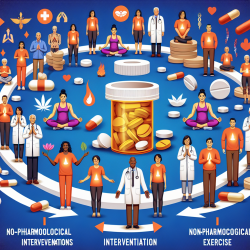Introduction
Chronic pain management, particularly for patients on long-term opioid therapy, is a pressing concern in primary care. With the risks associated with prolonged opioid use, there's an increasing demand for non-pharmacological interventions. A recent study titled "A patient activation intervention in primary care for patients with chronic pain on long term opioid therapy: results from a randomized control trial" sheds light on an innovative approach to addressing this challenge.
Understanding Patient Activation
Patient activation involves equipping patients with the knowledge, skills, and confidence to manage their health. The ACTIVATE study explored the impact of a brief, four-session patient activation intervention on patients with chronic pain undergoing long-term opioid therapy. The primary goal was to enhance patient activation, with secondary objectives including improved mood, overall health, and engagement with non-pharmacologic pain management strategies.
Key Findings from the ACTIVATE Study
The study, conducted in two primary care clinics, involved 376 participants who were randomized into two groups: those receiving the intervention and those receiving usual care. The results at 12 months were enlightening:
- Both groups showed similar patient activation scores, suggesting that the intervention did not significantly impact this primary outcome.
- The intervention group experienced less moderate to severe depression, with an odds ratio of 0.40.
- Participants in the intervention group reported higher overall health and greater use of health and wellness resources through patient portals.
- There was increased use of meditation and exercise/physical therapy in the intervention group.
Implications for Practitioners
While the primary outcome of increased patient activation was not achieved, the study highlights several critical areas for practitioners to consider:
- Focus on Depression and Overall Health: The intervention's impact on depression and overall health suggests that even brief interventions can have significant benefits. Practitioners should consider integrating similar strategies into their care plans.
- Leverage Patient Portals: Encouraging patients to engage with health and wellness resources through digital platforms can enhance their self-management capabilities.
- Promote Non-Pharmacologic Strategies: The increased use of meditation and exercise indicates a shift towards holistic pain management approaches, which can be beneficial in reducing reliance on opioids.
Encouraging Further Research
The ACTIVATE study opens avenues for further research. Future studies could explore the long-term impact of patient activation interventions and identify specific elements that contribute to improved outcomes. Additionally, tailoring interventions to individual patient needs and baseline activation levels could enhance their effectiveness.
For practitioners interested in the detailed findings and methodology of the study, the original research paper can be accessed here: A patient activation intervention in primary care for patients with chronic pain on long term opioid therapy: results from a randomized control trial.










